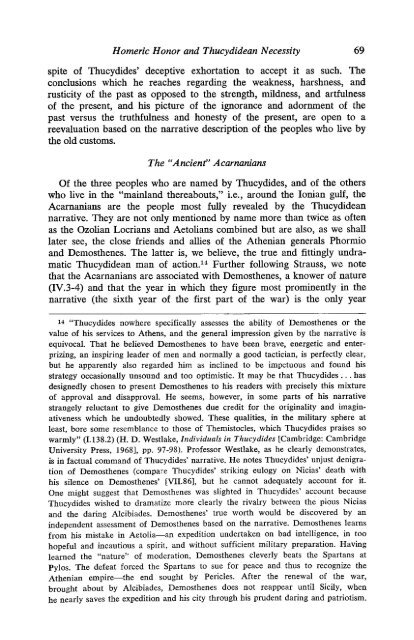philosophy - Interpretation
philosophy - Interpretation
philosophy - Interpretation
Create successful ePaper yourself
Turn your PDF publications into a flip-book with our unique Google optimized e-Paper software.
Homeric Honor and Thucydidean Necessity 69<br />
spite of Thucydides' deceptive exhortation to accept it as such. The<br />
conclusions which he reaches<br />
regarding the weakness, harshness, and<br />
rusticity of the past as opposed to the strength, mildness, and artfulness<br />
of the present, and his picture of the ignorance and adornment of the<br />
past versus the truthfulness and honesty of the present, are open to a<br />
reevaluation based on the narrative description of the peoples who live by<br />
the old customs.<br />
The "Ancient' Acarnanians<br />
Of the three peoples who are named by Thucydides, and of the others<br />
who live in the "mainland thereabouts,"<br />
i.e., around the Ionian gulf, the<br />
Acarnanians are the people most<br />
fully revealed by<br />
narrative. They are not only mentioned by<br />
the Thucydidean<br />
name more than twice as often<br />
as the Ozolian Locrians and Aetolians combined but are also, as we shall<br />
later see, the close friends and allies of the Athenian generals Phormio<br />
and Demosthenes. The latter is, we believe, the true and fittingly undramatic<br />
Thucydidean man of action.14 Further following Strauss,<br />
that the Acarnanians are associated with Demosthenes,<br />
we note<br />
a knower of nature<br />
(IV.3-4) and that the year in which they figure most prominently<br />
in the<br />
narrative (the sixth year of the first part of the war) is the only year<br />
14<br />
"Thucydides nowhere specifically assesses the ability of Demosthenes or the<br />
value of his services to Athens, and the general impression given by the narrative is<br />
equivocal. That he believed Demosthenes to have been brave, energetic and enterprizing,<br />
an inspiring leader of men and normally a good tactician, is perfectly clear,<br />
but he apparently also regarded him as inclined to be impetuous and found his<br />
strategy occasionally unsound and too optimistic. It may be that Thucydides . . . has<br />
designedly chosen to present Demosthenes to his readers with precisely this mixture<br />
of approval and disapproval. He seems, however, in some parts of his narrative<br />
strangely reluctant to give Demosthenes due credit for the originality and imagin<br />
ativeness which he undoubtedly showed. These qualities, in the military<br />
sphere at<br />
least, bore some resemblance to those of Themistocles, which Thucydides praises so<br />
warmly"<br />
(1.138.2) (H. D. Westlake, Individuals in Thucydides [Cambridge: Cambridge<br />
University Press, 1968],<br />
pp. 97-98). Professor Westlake, as he clearly demonstrates,<br />
is in factual command of Thucydides' narrative. He notes Thucydides' unjust denigra<br />
tion of Demosthenes (compare Thucydides' striking eulogy on Nicias' death with<br />
his silence on Demosthenes' [VTI.86], but he cannot adequately<br />
account for it.<br />
One might suggest that Demosthenes was slighted in Thucydides' account because<br />
Thucydides wished to dramatize more clearly the rivalry between the pious Nicias<br />
and the daring Alcibiades. Demosthenes'<br />
true worth would be discovered by an<br />
independent assessment of Demosthenes based on the narrative. Demosthenes learns<br />
from his mistake in Aetolia<br />
an expedition undertaken on bad intelligence, in too<br />
hopeful and incautious a spirit, and without sufficient military preparation. Having<br />
learned the "nature" of moderation, Demosthenes cleverly beats the Spartans at<br />
Pylos. The defeat forced the Spartans to sue for peace and thus to recognize the<br />
Athenian empire the end sought by Pericles. After the renewal of the war,<br />
brought about by Alcibiades, Demosthenes does not reappear until Sicily, when<br />
he nearly saves the expedition and his city through his prudent daring<br />
and patriotism.
















